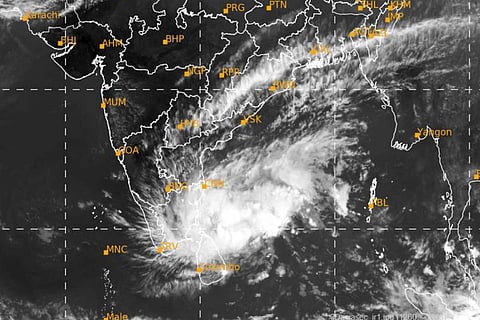

The #StopHindiImposition hashtag trended on Twitter on Wednesday, after the India Meteorological Department (IMD) tweeted updates on Cyclone Nivar in Hindi. At 11:47 am, the IMD’s official Twitter handle tweeted a slew of updates on Nivar, a cyclonic storm which will make landfall between Tamil Nadu and Puducherry on Wednesday, in Hindi. The Cyclone will affect Tamil Nadu, Andhra Pradesh and Puducherry.
प्रचण्ड चक्रवाती तूफान "निवार" बीते छह घंटे में 11 किमी प्रति घंटे की गति के साथ पश्चिम-उत्तर-पश्चिम दिशा की ओर बढ़ा और भारतीय समयानुसार आज सुबह , 25 नवंबर, 2020, 0830 बजे दक्षिण-पश्चिम बंगाल की खाड़ी में अक्षांश 10.7 °N एवं देशान्तर 81.7 °E पर केंद्रित है | pic.twitter.com/zAlzxCwNYK
— India Meteorological Department (@Indiametdept) November 25, 2020
For DGM IMD Briefing over NIVAR,please click here:https://t.co/pS8TJcwYwV
— India Meteorological Department (@Indiametdept) November 25, 2020
This is the first time that the IMD was tweeting updates on Cyclone Nivar in Hindi, tweets till then were in English. However, this thread which had details of the cyclonic storm was not posted in Telugu or Tamil, they were however tweeted in English. A translation of the Hindi tweets read
“In the last six hours, the severe cyclonic storm "Nivar" moved towards west-northwest direction with a speed of 11 kmph and latitude 10.7 ° in southwest Bay of Bengal in the morning of Indian time today, November 25, 2020, 0830 hrs. N and Longitude is centered at 81.7 ° E.”
Another tweet in Hindi below the first one stated: “Its (the cyclonic storm’s) distance is about 240 km east-southeast of Cuddalore, about 250 km east-southeast from Puducherry and 300 km south-southeast from Chennai. It is likely to intensify during the next 06 hours into an extremely severe cyclonic storm."
The third tweet stated that the cyclonic storm would cross the coasts of Tamil Nadu and Puducherry, between Karaikal and Mamallapuram, near Puducherry as a "very severe cyclonic storm in the midnight of November 25 and 26, and then move towards the west-northwest.”
The final tweet in Hindi said: “While crossing the coast, the average wind speed associated with this extremely severe cyclonic storm is estimated to be 120-130 kmph and maximum wind speed of 145 kmph.”
Reacting to the Hindi tweets, several users trended the #StopHindiImposition hashtag. Tamil is the official language of Tamil Nadu and the Union Territory of Puducherry and Karaikal, while Malayalam and Telugu are used for official purposes in Mahe and Yanam. Tamil and French are also spoken widely in Tamil Nadu and Puducherry. Several users asked why the tweets were not shared in Tamil, English and maybe even French, if the purpose was to inform those who would be affected.
You should be tweeting this in Tamil English and maybe French #stopHindiImposition https://t.co/0mALeEDDMi
— Poongulali (@poopoonga) November 24, 2020
What nonsense is this?
— Contractor செந்தில் (@senthilchandr) November 25, 2020
Why the hell do you tweet in Hindi for the cyclone heading to Tamilnadu?
Are we in India or HINDIA?
This is how @BJP4India@AmitShah @PMOIndia respects TAMIL & Tamilnadu?
Shame on u@VanathiBJP @Murugan_TNBJP @annamalai_k #stopHindiImposition #AntiTamilBJP https://t.co/Ian0fyp5Cm
Other users sarcastically wondered if the cyclone was crossing Uttar Pradesh and Bihar for the IMD to tweet updates in Hindi.
Cyclone is hitting South Indian states and"Indian meteorological department" is issuing alert in Hindi. For what use? Can someone please clarify#stopHindiImposition https://t.co/xopgQlaedk
— Deenesh (@deeneshgb) November 25, 2020
Oh didn't know that #NivarCyclone shifted to Uttar Pradesh. https://t.co/eziV4nBLjg
— priyankathirumurthy (@priyankathiru) November 25, 2020
This is not the first time that #StopHindiImposition has trended on Twitter in the south. Tamil Nadu, especially, has been strongly opposed to the efforts to introduce Hindi in the state by the Union government, and has seen a slew of anti Hindi agitations both pre and post Independence.
Earlier this year, the state saw protests against the Union government's New Education Policy (NEP) which recommended introducing a three-language system, including Hindi, English and a regional language. All major parties of the state opposed the move, calling it a deliberate attempt to impose Hindi on the state’s population. Chief Minister Edappadi K Palaniswami too wrote a letter to the Union Minister of Education Ramesh Pokhriyal Nishank, reiterating that the state would continue with a 2-language policy of instruction in Tamil and English.